
CLASSICAL ANTIQUITY
Scope & Guideline
Fostering Critical Conversations in Classical Studies
Introduction
Aims and Scopes
- Interdisciplinary Approaches to Classical Studies:
The journal emphasizes the importance of combining various disciplines such as history, literature, philosophy, and archaeology to offer a nuanced understanding of ancient texts and contexts. - Exploration of Gender and Identity in Antiquity:
A consistent focus on themes of gender, slavery, and identity reflects the journal's commitment to examining the social constructs and hierarchies present in ancient societies. - Cultural and Ecological Contexts:
The journal frequently addresses the interplay between cultural narratives and ecological factors, exploring how ancient societies interacted with their environments. - Innovative Literary Analysis:
A core area of focus is the analysis of literary works, employing contemporary theoretical frameworks to reinterpret classical texts and their significance. - Historical Relevance and Modern Implications:
The journal seeks to draw connections between ancient practices and modern societal issues, showcasing the timeless relevance of classical antiquity.
Trending and Emerging
- Ecocriticism and Environmental Perspectives:
There is a noticeable increase in studies that examine the ecological implications of classical texts, reflecting a growing trend in the humanities to address environmental concerns through historical lenses. - Mental Health and Emotional Cognition in Antiquity:
Recent works focus on the intersections of psychology and ancient texts, exploring themes of trauma, memory, and emotional expression, which are gaining traction in classical scholarship. - Reinterpretation of Classical Texts through Modern Theoretical Frameworks:
The use of contemporary theories, such as feminist theory and neurodiversity, to reinterpret classical literature is becoming more prominent, suggesting a trend towards innovative analytical frameworks. - Artistic and Visual Representations in Classical Contexts:
There is an emerging interest in how classical themes are represented in modern artistic forms, highlighting the relevance of classical antiquity in contemporary culture. - Questions of Otherness and Foreignness:
Themes surrounding the foreigner and the concept of otherness are increasingly explored, reflecting a broader interest in globalization and its historical roots.
Declining or Waning
- Traditional Historical Narratives:
There seems to be a waning interest in conventional historical narratives that focus solely on political events or figures, as scholars increasingly seek to explore broader cultural and social themes. - Purely Textual Analysis without Contextualization:
The emphasis on textual analysis devoid of contextual or interdisciplinary approaches appears to be decreasing, as recent publications favor more integrative methodologies. - Static Interpretations of Mythology:
Previous rigid interpretations of mythological narratives are being replaced by dynamic readings that consider contemporary issues, indicating a shift towards more fluid and interpretative frameworks.
Similar Journals
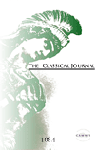
CLASSICAL JOURNAL
Fostering Insight into Timeless Texts and TraditionsCLASSICAL JOURNAL, published by the esteemed Johns Hopkins University Press, stands as a premier academic platform dedicated to the exploration and analysis of classical studies, focusing on ancient Greek and Roman literature, history, and culture. With an impressive impact factor and categorized in the Q1 quartile for Classics in 2023, the journal provides high-quality, peer-reviewed articles that contribute significantly to our understanding of classical antiquity. Researchers and students from around the globe turn to CLASSICAL JOURNAL for groundbreaking insights, as it consistently ranks in the top tier of its field, occupying rank #52 in the Scopus listings within the Arts and Humanities sector, placing it in the 69th percentile. While the journal maintains a traditional subscription model, its rich content and scholarly relevance make it an essential resource for anyone engaged in the study of the classical world, enhancing the academic discourse surrounding this timeless and influential area of study.

Exemplaria Classica
Charting New Territories in Classical LiteratureExemplaria Classica, published by Universidad de Huelva's Servicio de Publicaciones, is a prominent academic journal dedicated to the fields of Classics and Literature and Literary Theory. Established in 2011, this journal serves as a vital resource for scholars, educators, and students interested in the rich tapestry of classical literature and its enduring influence on contemporary thought. With an ISSN of 1699-3225 and an E-ISSN of 2173-6839, it has firmly established itself in the academic community, although it currently holds a Q4 ranking in both its categories. The journal is ranked #712 out of 1106 in Literature and Literary Theory and #129 out of 170 in Classics as per Scopus rankings, reflecting its emerging status in these fields. Despite its open access designation being currently unclear, Exemplaria Classica is essential for advancing discussions and research in classical studies and has covered a diverse range of topics over its publishing years, making it an important addition to any academic library.

RAMUS-CRITICAL STUDIES IN GREEK AND ROMAN LITERATURE
Illuminating Classical Texts for Modern MindsRAMUS: Critical Studies in Greek and Roman Literature, published by Cambridge University Press, stands as a premier journal dedicated to the exploration and analysis of classical literary texts. Established in 2002, this journal has garnered recognition in its field, achieving a Q1 category ranking in both Classics and Literature and Literary Theory for 2023, which reflects its commitment to scholarly excellence. With an impressive Scopus ranking, where it places in the 76th percentile for Literature and Literary Theory and the 70th percentile for Classics, RAMUS is a critical resource for researchers, professionals, and students engaged in the study of ancient texts and their lasting impact on contemporary literature. Although currently not an open-access journal, it offers a wealth of peer-reviewed articles, reviews, and critical essays that enrich understanding and foster discussions in the realms of Greek and Roman literary traditions. This journal not only serves as an academic platform but also contributes to the ongoing dialogue on the relevance of classical literature in today's cultural and literary discourse.
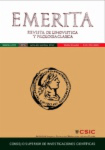
Emerita
Illuminating the Richness of Classical Studies and LinguisticsEmerita is a distinguished academic journal published by CONSEJO SUPERIOR INVESTIGACIONES CIENTIFICAS-CSIC in Spain, focusing on the fields of Classics and Linguistics. With its roots dating back to 1971, Emerita has established itself as an open-access publication since 1974, ensuring broad accessibility for researchers, professionals, and students alike. This journal's commitment to scholarly excellence is reflected in its 2023 Q2 classification in Classics and Q3 in Linguistics and Language, making it a vital resource for those engaged in classical studies and language research. In the Scopus rankings, it holds respectable standings, including Rank #76/170 in Arts and Humanities Classics and Rank #695/1088 in Language and Linguistics, demonstrating its significant presence and influence within these academic disciplines. The editorial office is located at Editorial CSIC, C/VITRUVIO 8, 28006 MADRID, SPAIN, where it continues to curate important research that contributes to the understanding and appreciation of classical literature and linguistic theory.

Auster
Bridging disciplines for a richer understanding of humanity.Auster is a prominent open-access journal dedicated to advancing interdisciplinary research within the fields of Humanities and Educational Sciences. Published by the esteemed Universidad Nacional de La Plata, specifically by the Faculty of Humanities and Educational Sciences, this journal has been a cornerstone for scholarly discourse since its establishment in 1996. With an ISSN of 1514-0121 and an E-ISSN of 2346-8890, Auster ensures wide accessibility to innovative research and critical analyses. Its commitment to open access fosters an inclusive academic environment, allowing researchers, students, and professionals in Argentina and beyond to engage with high-quality content that stimulates new ideas and interdisciplinary collaboration. The journal strives to publish timely, relevant articles that explore contemporary challenges in humanities and education, thereby positioning itself as an essential resource for anyone invested in these dynamic fields.

Myrtia
Exploring biodiversity to enrich our planet.Myrtia is a distinguished academic journal published by Universidad de Murcia, focusing primarily on the fields of environmental sciences and biodiversity. With the ISSN 0213-7674 and E-ISSN 1989-4619, it serves as a vital platform for researchers and professionals to disseminate innovative findings and foster discussions that advance our understanding of ecological dynamics and sustainable practices. The journal reflects a commitment to promoting open access knowledge, aiming to increase the visibility and impact of research in these critical areas. As researchers seek to address pressing environmental challenges, Myrtia remains an essential resource for high-quality, peer-reviewed articles that contribute to a holistic understanding of our ecosystem. Its association with a reputable institution and dedication to scholarly excellence makes it a key player in the academic landscape, inviting contributions that shape future environmental research and policy.

Synthesis-La Plata
Cultivating a global dialogue in the Humanities.Synthesis-La Plata is an esteemed academic journal published by UNIV NAC LA PLATA, FAC HUMANIDADES & CIENCIAS EDUC, focusing on the fields of Arts, Humanities, and Social Sciences, with a particular emphasis on Literature, Literary Theory, and Linguistics. Since its inception in 2009, this Open Access journal has been dedicated to providing a platform for scholarly discourse and innovative research, allowing unrestricted access to a multitude of international studies. Although it experienced a hiatus in its Scopus coverage between 2012 and 2014, the journal continues to foster critical analysis and promotes interdisciplinary approaches within its domains. With an ISSN of 0328-1205 and an E-ISSN of 1851-779X, Synthesis-La Plata aims to reach a diverse readership, including researchers, educators, and students who seek to deepen their understanding of literary and linguistic dynamics. Despite its recent Scopus rankings indicating low percentiles, the journal remains a significant resource for scholarly inquiry in the humanities."
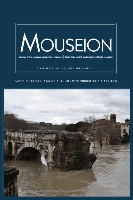
Mouseion-Journal of the Classical Association of Canada
Where classical inquiry meets modern discourse.Mouseion - Journal of the Classical Association of Canada, published by University of Toronto Press Inc, stands as a vital academic resource in the fields of Classics and Archaeology. With a focus on promoting scholarly discourse, this journal provides a platform for original research, critical reviews, and interdisciplinary studies that engage with ancient cultures and their legacies. Since its convergence in 2019, Mouseion has quickly established itself within the academic community, achieving a commendable Q1 ranking in Classics and Q2 in both Archaeology categories in 2023, showcasing its commitment to excellence. While not an open-access journal, it is positioned among the top 29% of classics journals, reflecting its impact and the quality of publications. Nestled within Canada, this journal addresses a global audience of researchers, professionals, and students dedicated to the exploration of the classical world, and it endeavors to contribute significantly to the scholarly understanding of cultural heritage.
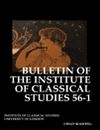
BULLETIN OF THE INSTITUTE OF CLASSICAL STUDIES
Pioneering Research at the Intersection of Classics and ModernityBULLETIN OF THE INSTITUTE OF CLASSICAL STUDIES, published by Oxford University Press, serves as a vital platform for the dissemination of research in the fields of Classics, Archaeology, History, and Linguistics. Established in 1954 and continuing to present day, this journal emphasizes scholarly contributions that delve into the nuances of ancient civilizations while fostering interdisciplinary dialogue. With an impact factor reflective of its performance in the Q4 quartiles across various fields, it provides a unique fusion of traditional and contemporary inquiries that challenge existing paradigms. This esteemed journal also stands out for its comprehensive coverage, appealing to a diverse audience comprising researchers, professionals, and students aiming to enrich their understanding of classical studies. Although it currently does not offer open-access options, the BULLETIN remains committed to advancing knowledge and scholarship in an increasingly complex academic landscape, prioritizing the dissemination of rigorous research that contributes to the humanities.
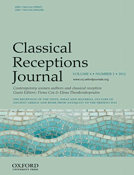
Classical Receptions Journal
Exploring the Echoes of Antiquity in Modern CultureClassical Receptions Journal, published by Oxford University Press, is a leading scholarly periodical that engages with the intersection of classical studies and contemporary culture. With its ISSN 1759-5134 and E-ISSN 1759-5142, the journal has established itself as a notable platform for innovative research that examines how classical texts, themes, and ideas continue to resonate in modern contexts. With a scope that includes the realms of Arts and Humanities, Classics, and Cultural Studies, this journal is ranked in the Q2 category for Classics and Q3 for both Arts and Humanities and Cultural Studies, demonstrating its significant impact in the field. Researchers and students will find a wealth of peer-reviewed articles that not only explore historical reception but also inspire new conversations and methodologies. The journal's commitment to publishing quality scholarship makes it an essential resource for anyone interested in the ongoing relevance of classical antiquity in today’s world, from its home base in the United Kingdom at Great Clarendon St, Oxford.